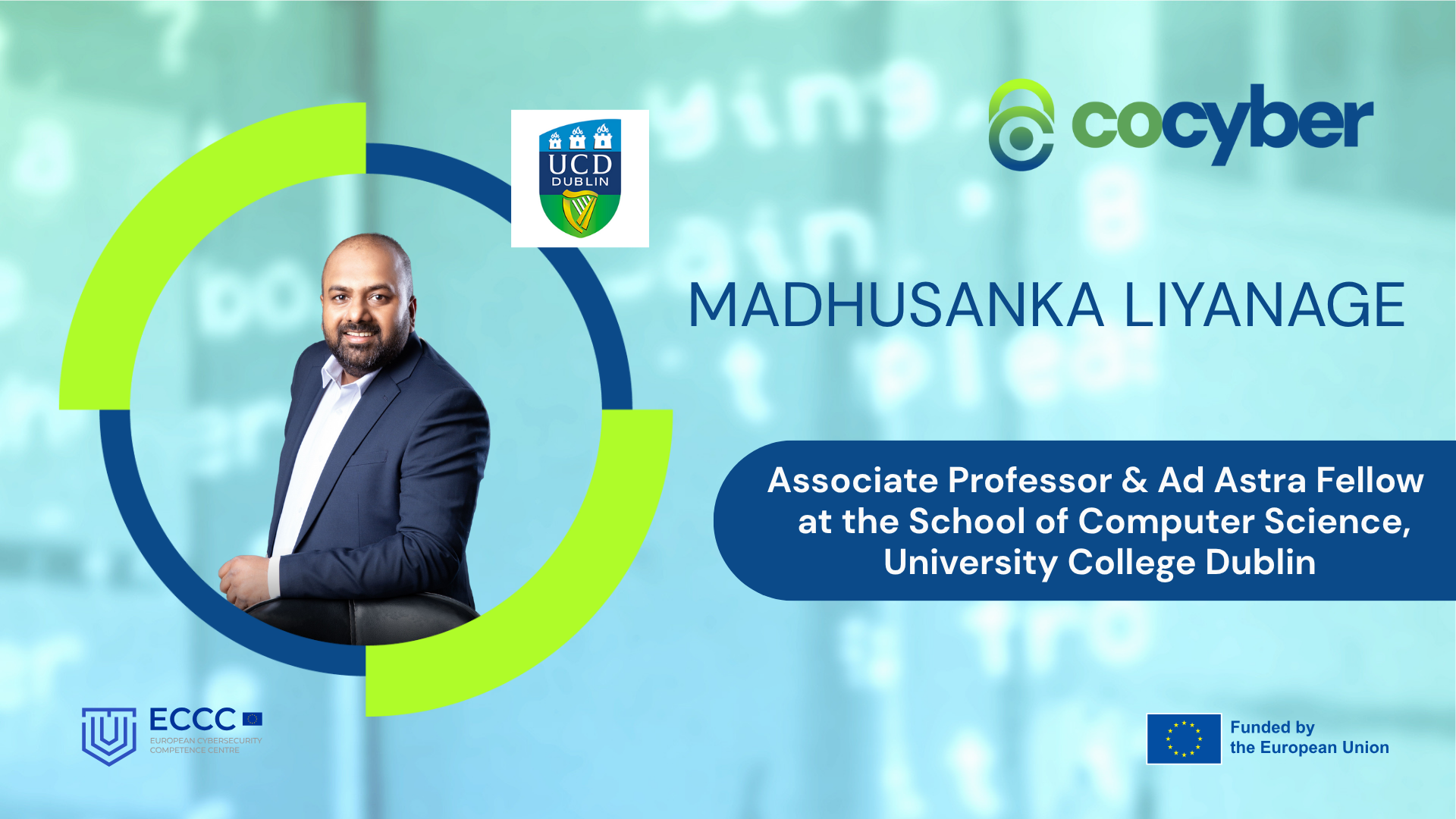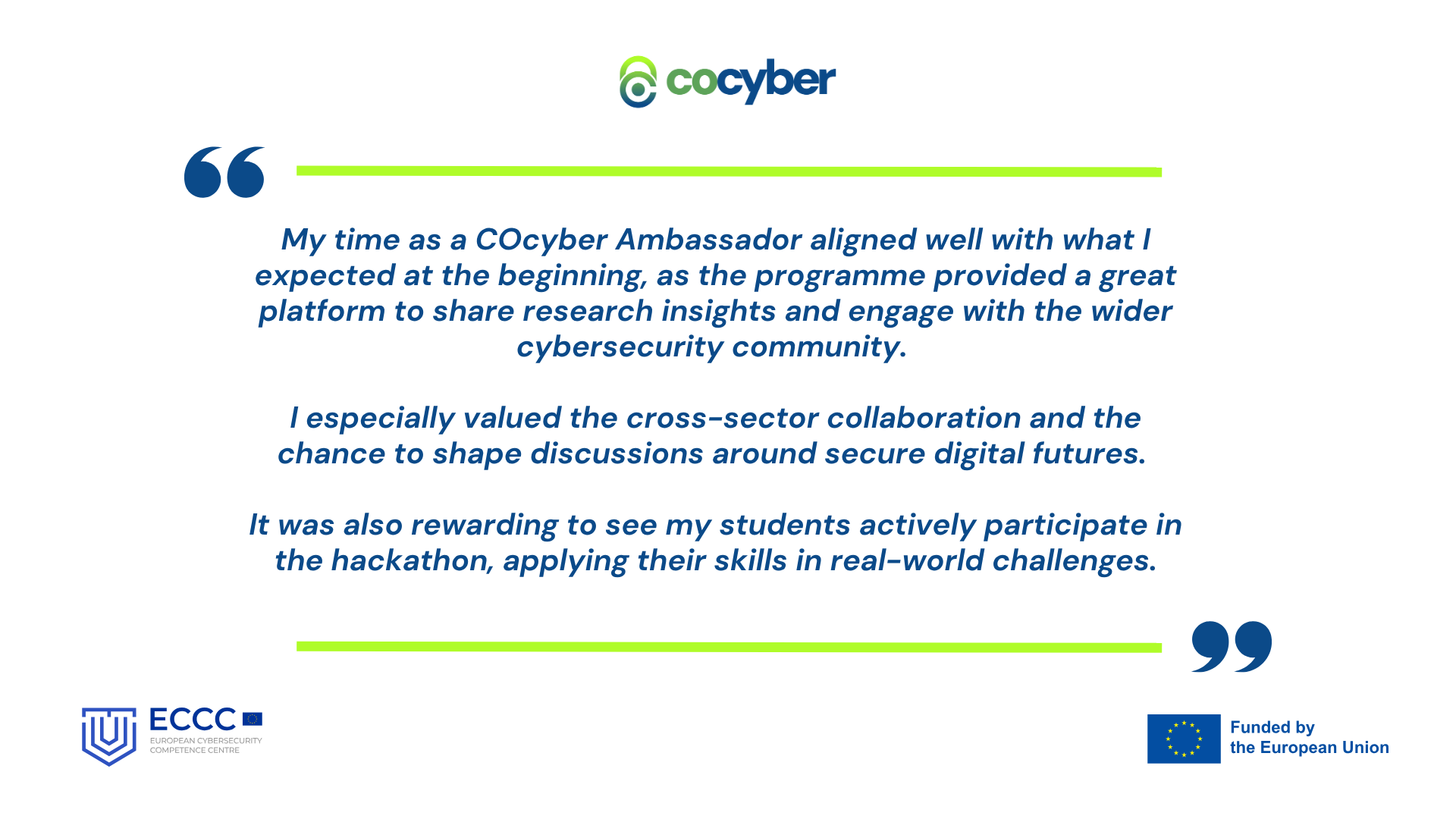COcyber Batch #1 Ambassadors in the Spotlight: Madhusanka Liyanage

Six months ago, the COcyber project launched the first round of its Ambassador Programme, an initiative designed to strengthen communication and engagement across Europe’s cybersecurity ecosystem. The programme brought external voices into the project’s outreach efforts, inviting experienced professionals to contribute through public dialogue, community engagement, and strategic insights.

As the first ambassador cohort concludes its mission, we’re taking time to reflect on each of their contributions, perspectives, and what they see as key priorities going forward.
In this article, we spoke with Madhusanka Liyanage to hear about his experience, his views on European cybersecurity, and his message as this six-month journey comes to an end.
Who are you, and what is your professional background?
I am an Associate Professor and Ad Astra Fellow at the School of Computer Science at University College Dublin, where I lead the Network Softwarization and Security Labs (NetsLab). My research focuses on the security and privacy of next-generation mobile networks, especially 5G and 6G. I also hold adjunct and honorary professorships in Finland and Sri Lanka and collaborate widely with academic and industrial partners worldwide.

Over the years, I’ve received numerous awards for research excellence and have been ranked among the world’s top 2% scientists by Elsevier and Stanford University. I’ve published more than 250 academic works, authored and edited several books, and secured over €8 million in research funding. Alongside my academic work, I contribute to European cybersecurity efforts through roles with ENISA, 6G-IA, and other expert bodies.
Since when and how are you involved in the European cybersecurity sector?
My involvement in European cybersecurity spans more than a decade and includes leadership in major Horizon Europe research projects focused on secure 5G/6G networks. As Technical Manager and Coordinator of initiatives like ROBUST-6G and ENSURE-6G, I’ve worked on solutions for privacy-preserving, scalable mobile communication systems.
I also actively contribute to standardisation through ETSI and 6G-IA, representing Ireland in relevant working groups and helping to shape the European agenda on mobile cybersecurity. My work bridges research and application, combining technical expertise with policy engagement and supporting the integration of security into next-generation digital infrastructure.
From your perspective, what are the main challenges in the collaboration of the civilian and defence cybersecurity sector in Europe?
Civilian and defence cybersecurity sectors often have different mandates. While the civilian side focuses on protecting data, services, and digital infrastructure, the defence sector is geared toward national security and responses to state-level threats. These differences create misalignments in regulation, strategy, and operational culture.
Additional challenges include the lack of interoperability between systems, technological silos within the defence sector, and restricted access to classified information. These issues limit opportunities for effective civilian contributions. Combined with shifting geopolitical pressures and increasingly sophisticated cyber threats, they highlight the urgent need for better coordination and shared frameworks.
Again, from your perspective, what are the most crucial steps to address these challenges and strengthen Europe’s joint digital safety efforts?
We need a unified cybersecurity regulatory framework that addresses the distinct requirements of both civilian and defence stakeholders while promoting shared objectives. Developing joint threat intelligence platforms—supported by agencies like ENISA—would enhance information exchange and improve overall response capacity.
Equally important is the promotion of public-private partnerships, increased investment in dual-use technologies, and the creation of dedicated training initiatives. By encouraging alignment across academic, industrial, and governmental actors, we can build a more integrated, robust, and future-ready cybersecurity environment in Europe.
Did your experience as a COcyber Ambassador align with what you expected at the beginning and what are your key reflections now that the journey is ending?

Yes, it did. The programme provided a great platform to share research insights and engage with the wider cybersecurity community. I especially valued the cross-sector collaboration and the chance to shape discussions around secure digital futures. It was also rewarding to see my students actively participate in the hackathon, applying their skills in real-world challenges.

